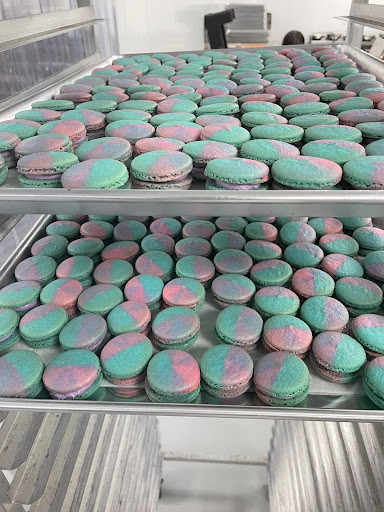
As luxury goods increasingly penetrate everyday lives, the food industry is stepping up to the plate of consumer demand. With prepackaged chocolate eclairs, crepes, tiramisu, beignets, and palmiers now available at many major chain stores, it's clear that desserts that were previously reserved for bakeries and patisseries have found their way around the world through innovations in mass manufacturing processes. Yet, one delectable dessert remains mysteriously missing from supermarket cafe displays behind glass: macarons.
Despite their inaccessibility, they've grown in market penetration 13-fold over the last decade. Combining their United States and Europe market sizes, macarons are projected to grow from $1.43 billion in 2022 to $3.17 billion by 2033. That's because apart from their prestige status in Europe, they are utterly delightful pockets of flavor for an increasingly health-conscious consumer base.
Parisian macarons are precious, palm-sized sweet confections made of two meringue cookies filled with ganaches, jams, or buttercreams. The wide variety of flavors that chefs can play with maintain a subtly sweet nuttiness, and combined with a delightfully flaky texture, they make for the perfect celebration to any occasion, whether a sweet treat during midday breaks or a wedding gift. Additionally, they are less sugary than other comparable pastries, are gluten-free, and healthy ingredients can easily be added to boost their nutritional value. For example, Macaron Queen's orange turmeric macarons were developed with turmeric's anti-inflammatory and antioxidant attributes in mind.
Perhaps the most eye-catching quality of the French macaron is its ability to add joyful pops of color to any storefront. Red, blue, purple, pink, green, and everything in between, macarons can be made in batches to fit any theme, season, colorway, and display.
As their fan base grows in kind with their profit margins, it's a wonder why macarons aren't more prevalent in the USA. The answer to that conundrum lies in their reputation as the 'impossible dessert'. Since their inception in 20th-century France, macarons are notoriously difficult to make at home, and even harder to mass produce. Head chefs at worldwide hotel groups find that baking them on sheet pans results in deformed macarons on the edges. Commercial confectionary manufacturers find that they are time-consuming and unprofitable compared to the traditional 'drop, bake, and sell' process. Macarons have long been seen as uneconomical, inefficient, and wasteful.
This means that no matter how big the demand for these sweet treats is, food businesses, influencers, and others trying to get in on the pre-packaged dessert game find it impossible to find co-packers and private-label manufacturers. "If the space hasn't already been filled by predecessors, you simply can't make your food," adds Nina Gann, co-founder of Macaron Queen, "Even looking outside the United States, international companies work on much larger orders than they'll accept from smaller businesses."
Additionally, threats of 10% tariffs hang on the horizon for European macaron importers, which means rising costs for American buyers. Looking inland, there is one saving grace to the lack of macaron mass producers: Macaron Queen. Founded by Finia Jahangard and Nina Gann. They've stood apart from European and American competitors by remaining true to their quality and price since opening in 2012. With richer macarons than their French counterparts, Macaron Queen found the secret to mass production by innovating the macaron's traditional form. By filling in their air pockets, the company made a macaron that's more economical, transportable, and just as flavorful.
"In the past, some businesses were apprehensive of adding macarons to their repertoires due to their cost and delicate nature. However, with mindful packaging and a simple adjustment to the recipe, they quickly become one of the most desirable and profitable products on the shelf of any business," Nina explains.
Having found a way to get macarons on an automated production line, Macron Queen bakes 4 million macarons a year when holidays are taken into account. With a 50,000 sq ft facility within the US, they produce a variety of macaron recipes and flavors for over 300 businesses across the country. With regional distributors, Macaron Queen has also entered the displays of many in-store bakery franchises.

Its success lies in Macaron Queen's ability to serve the precise interests of its clients. Offering both branded and private-labeling manufacturing services, Macaron Queen adjusts their recipes to any consumer's taste and budget. Macarons are easy on the eyes and easier on the stomach, making them the ultimate treat to add to the repertoires of cafes, boba shops, hotels, and other branded merchandise lines.
Macaron Queen has continued innovating with unique shells, tie-dye macarons, dual-fillings, and more, the manufacturer also stays with their clients throughout the development process. From sifting almond flour to printing custom labels, their clients are given a white glove service, along with infinitely marketable and tasty macarons. With plans to enter the in-store retail space in the pipeline, Macaron Queen is committed to their mission of making macarons accessible to the entire US market.







